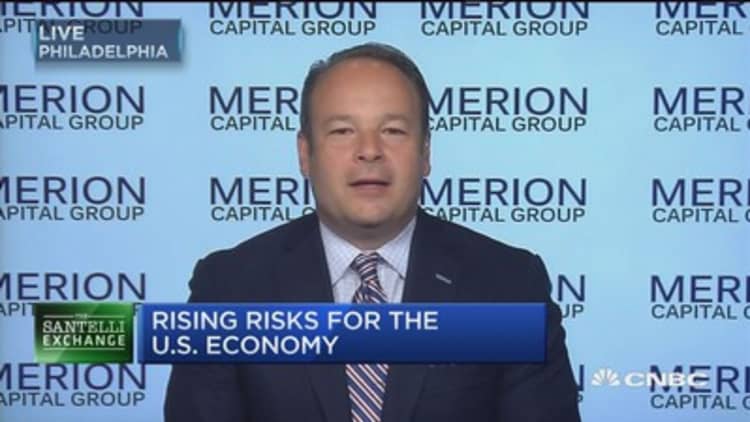
The performance of the U.S. economy has been disappointing this year to say the least, and in one respect it's the biggest letdown since 2011.
Citigroup's Economic Surprise Index, a widely followed indicator of how the data are matching up to expectations, continues to plumb new depths.
In fact, the index hasn't been this low since late August 2011, when the White House and Congress brought the country to the brink of a debt default, economists worried about a double-dip recession, and the European debt crisis raged on.
The Citi index almost by design zigs and zags — data points miss economists' optimistic projections, sending the gauge lower, after which they recalibrate their views and adjust their estimates lower. That adjustment then usually prompts a move higher in the surprise index.
However, it's been since January to July 2012 since the index has seen higher highs and lower lows.
"It's a very, very cyclical indicator. The good news is that when it's down this hard it usually starts to bounce back up," said Ed Yardeni, head of Yardeni Research and someone who keeps a watch on the index. "With the Trump election and these animal spirit indicators flying, maybe economists got a little bit too optimistic about what the near-term impact would be on the hard data."
Indeed, Donald Trump's November victory brought with it hopes that GDP growth would jump above 3 percent after an extended post-recession period milling around 2 percent. The Trump agenda of tax cuts, less regulation and infrastructure spending sparked a jump in multiple sentiment indicators and another leg up in the second-longest bull run in stock market history.
However, the hard data have had a tough time keeping up with those high hopes, though expectations remain high — perhaps too high. Retail sales, job creation and productivity are just some of the economic reports that have fallen short of expectations recently.
"The economy's pretty much performing as it has since 2010," Yardeni said. "Obviously, we've got some drags."
Bringing out the bears
A spectrum of indicators is raising a heightened level of pessimism from some of the more contrarian corners of market analysis.
Brad McMillan, chief investment officer at Commonwealth Financial Network, believes the current period is starting to look a lot like the 1999-2000 period — when sentiment indicators and stock market performance peaked, only to lead to a recession.
He points to a number of areas that topped out in 1999 and slid in 2000: surging business and consumer confidence, spreads between yields on 10-year and three-month government debt, job creation and, finally, the .
"With the wisdom of hindsight, though, we know that even as things were great, the seeds of the next downturn were already growing," McMillan wrote in a blog post. "What we really need to know is not what the comparison tells us about today, but what it means for us in the future."
One other factor in play is the Federal Reserve, which is in the process of raising interest rates even though inflation currently remains well below the central bank's 2 percent target.
Peter Boockvar, chief market analyst at the Lindsey Group, wonders if this isn't "the reverse of the David Tepper moment for markets." The reference is to remarks the hedge fund manager made Sept. 24, 2010, on CNBC that started the "Tepper rally" in stocks. In that interview, Tepper said either the economy would mend on its own or the Fed would provide stimulus, so the only choice was to buy stocks.
Boockvar said that with the Fed raising rates, the Tepper scenario no longer applies.
"Now, if the economy remains steady and/or gets better, the Fed will keep on tightening and if the economy rolls over, then there is not much room between 1.5 percent growth and no growth and/or a recession," Boockvar told clients.


